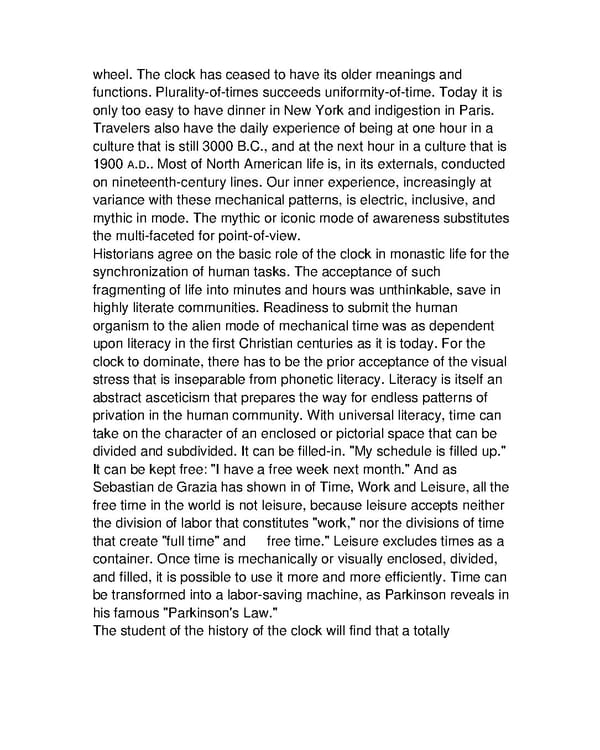wheel. The clock has ceased to have its older meanings and functions. Plurality-of-times succeeds uniformity-of-time. Today it is only too easy to have dinner in New York and indigestion in Paris. Travelers also have the daily experience of being at one hour in a culture that is still 3000 B.C., and at the next hour in a culture that is 1900 A.D.. Most of North American life is, in its externals, conducted on nineteenth-century lines. Our inner experience, increasingly at variance with these mechanical patterns, is electric, inclusive, and mythic in mode. The mythic or iconic mode of awareness substitutes the multi-faceted for point-of-view. Historians agree on the basic role of the clock in monastic life for the synchronization of human tasks. The acceptance of such fragmenting of life into minutes and hours was unthinkable, save in highly literate communities. Readiness to submit the human organism to the alien mode of mechanical time was as dependent upon literacy in the first Christian centuries as it is today. For the clock to dominate, there has to be the prior acceptance of the visual stress that is inseparable from phonetic literacy. Literacy is itself an abstract asceticism that prepares the way for endless patterns of privation in the human community. With universal literacy, time can take on the character of an enclosed or pictorial space that can be divided and subdivided. It can be filled-in. "My schedule is filled up." It can be kept free: "I have a free week next month." And as Sebastian de Grazia has shown in of Time, Work and Leisure, all the free time in the world is not leisure, because leisure accepts neither the division of labor that constitutes "work," nor the divisions of time that create "full time" and free time." Leisure excludes times as a container. Once time is mechanically or visually enclosed, divided, and filled, it is possible to use it more and more efficiently. Time can be transformed into a labor-saving machine, as Parkinson reveals in his famous "Parkinson's Law." The student of the history of the clock will find that a totally
 Understanding Media by Marshall McLuhan Page 170 Page 172
Understanding Media by Marshall McLuhan Page 170 Page 172